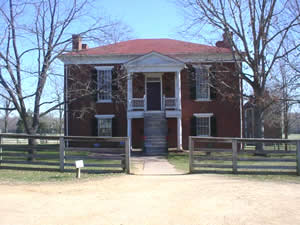Appomattox: Final Days of the Confederacy

Appomattox Court House
As the late winter rains and winds swept over Virginia, General Grant, whose lines extended south of Petersburg and around toward the West began to move gradually to cut off the remaining access to the city of Richmond. As he neared the last rail line, it became apparent to Jefferson Davis and the Confederate government, as well as to General Lee and the Army of Northern Virginia, that they would at either have to depart Richmond or become Grant's captives, for they would be completely surrounded without resources and thus at the mercy of the Yankee army.
In Church in St. Paul's Cathedral on a Sunday morning, President Davis was informed by an aide that Union soldiers were close and he had best depart. He and his wife boarded the last train out of the city. When General Lee's leading division commander who was to be the first out of the city asked Lee where he should head, Lee is reported to have said, “Tennessee.” In other words, as far as possible. So Lee broke about out of Richmond, but after a number of days of bloody fighting, Union cavalry under the command of General Philip Sheridan captured the last of Lee's supply trains, and the union V Corps, now commanded by Major General Joshua Chamberlain, moved around behind Sheridan's troopers, forward of Lee's advancing troops. General Gordon, Commanding the II Corps which was leading Lee's army, soon realized that between Sheridan's cavalry and the heavy Corps of infantry, now reinforced by General Ord's Army of the James, that the game was up, and he so informed General Lee. Lee sent a message to General Grant offering to meet to settle terms, and the two generals who had been hammering at each other since the previous May met in the home of Wilbur McLean at Appomattox Courthouse on the morning of April 9, 1865.
The meeting between Generals Lee and Grant has been well documented. The two generals were cordial to each other, and as they discuss the terms of surrender, General Grant made several concessions to ease the burden faced by Lee's men. As staff officers stood by respectfully, the two generals signed the papers, and the war was over—for all practical purposes. It had been made clear to General Grant, an in turn to General Lee, that the only issue to be decided at that juncture was the surrender of the Army of Northern Virginia. The issue of the existence of a separate Confederate nation had never been resolved from the point of view of the federal government; thus there would be no signing of a peace treaty of any sort. The armies lay down their arms, the fighting stopped, and the country went forward as both sides lick their wounds.
Grant went back to Washington, conferred briefly with President Lincoln, and then set off to visit family outside the city, we rode back to Richmond where he was warmly greeted, but he sought no accolades, retiring to his home in solitude and peace for the first time in four years. Upon leaving his army General Lee sent them this message:
After four years of arduous service, marked by unsurpassed courage and fortitude, the Army of Northern Virginia has been compelled to yield to overwhelming numbers and resources.
I need not tell the survivors of so many hard-fought battles who have remained steadfast to the last that I have consented to this result from no distrust of them; but feeling that valor and devotion could accomplish nothing that could compensate for the loss that would have attended the continuance of the contest, I determined to avoid the useless sacrifice of those whose past services have endeared them to their countrymen. By the terms of the agreement, officers and men can return to their homes and remain until exchanged.
You may take with you the satisfaction that proceeds from the consciousness of duty faithfully performed, and I earnestly pray that a merciful God will extend to you his blessing and protection.
With an unceasing admiration of your constancy and devotion to your country, and a grateful remembrance of your kind and generous consideration of myself, I bid you all an affectionate farewell.
They were undoubtedly the saddest words Robert E. Lee ever published.
| Civil War Home | 1864-1865 | Updated June 20, 2017 |